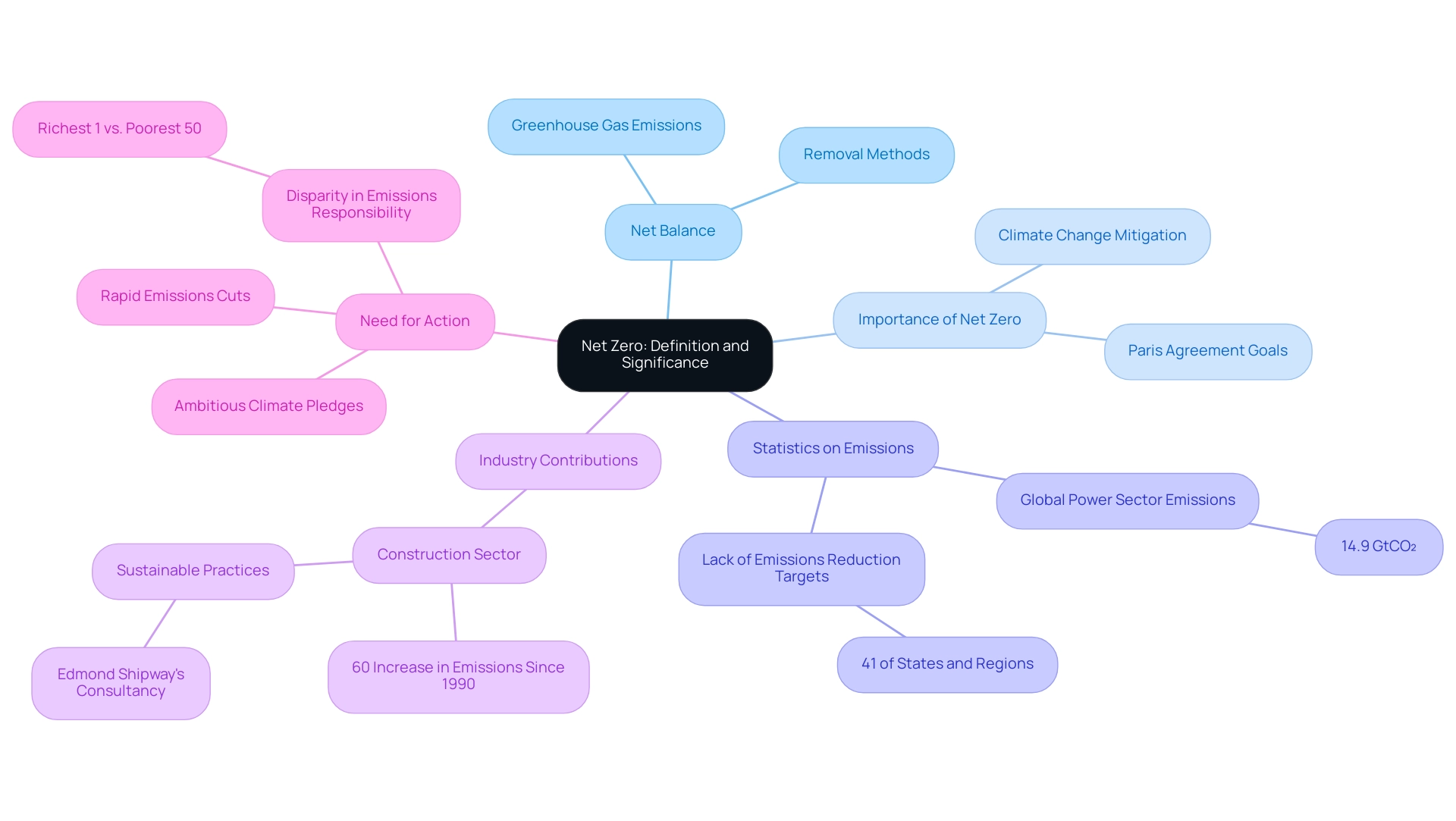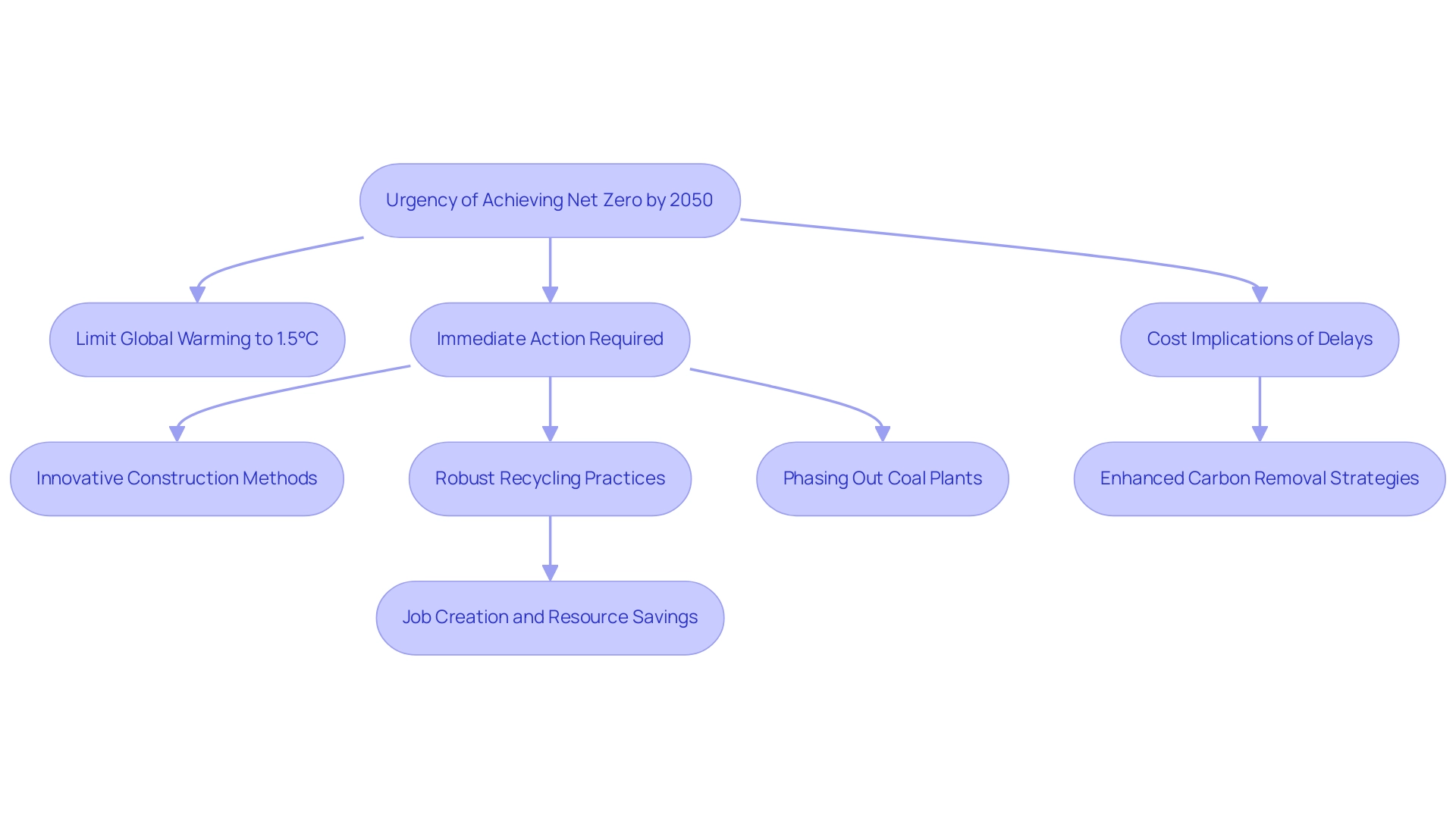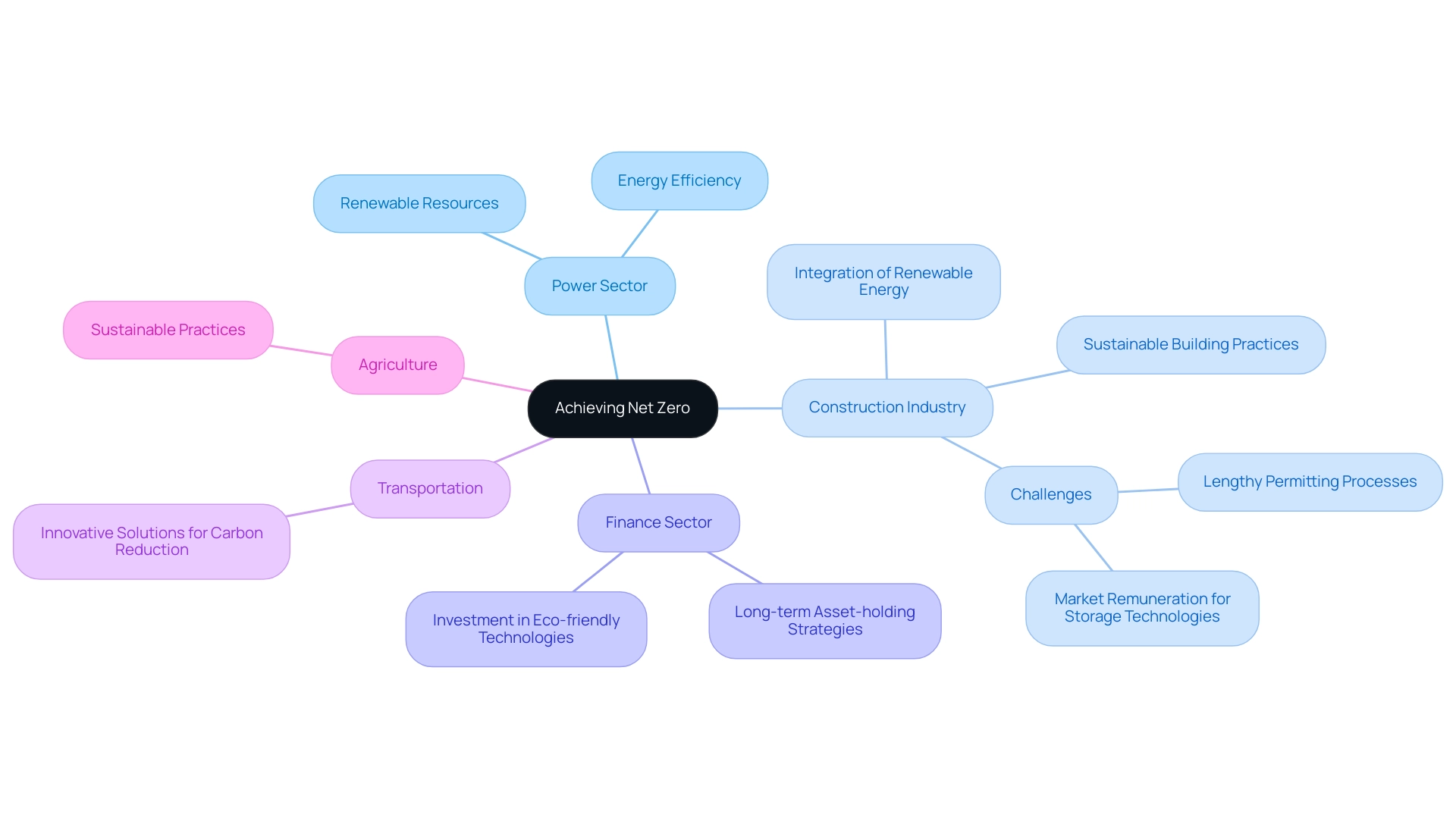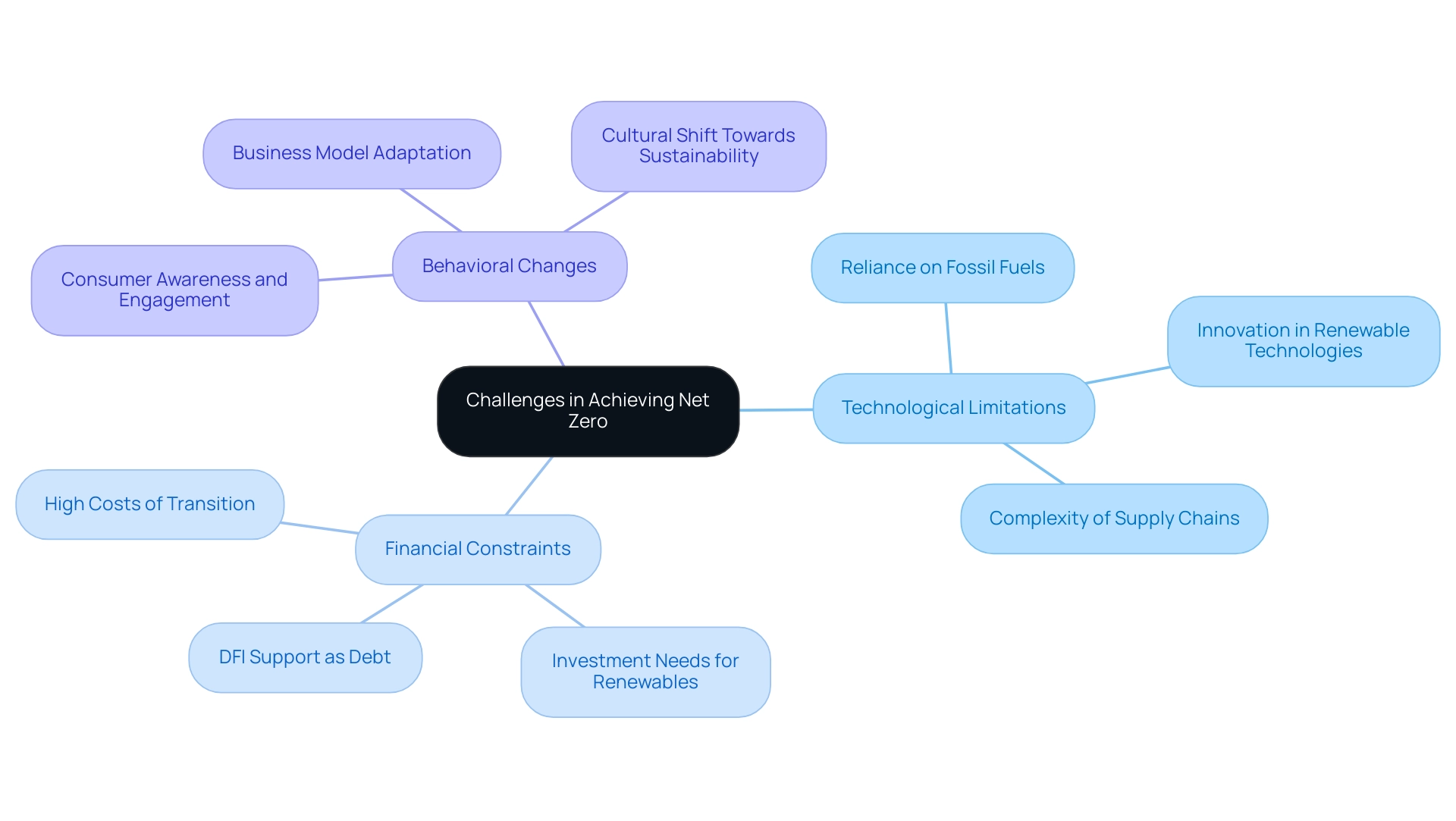27 Mar 2025
BlogOverview
Net zero is paramount as it signifies the equilibrium between greenhouse gases emitted and those removed from the atmosphere. This balance is essential for stabilising global temperatures and mitigating the impacts of climate change. Achieving net zero by 2050 is not just important; it is crucial for limiting global warming to 1.5°C. The urgency of this goal is underscored by the need for ambitious climate commitments.
Without decisive action, we risk facing dire consequences, including:
- Extreme weather events
- Significant biodiversity loss
Are we prepared to confront these challenges? The time to act is now.
Introduction
In the face of escalating climate challenges, achieving net zero emissions stands as a critical focal point in global efforts to combat climate change. This ambitious goal seeks to balance greenhouse gas emissions with their removal, transforming what was once a theoretical ideal into a pressing necessity for stabilising our planet’s climate. With over 145 countries and numerous corporations pledging to reach net zero by 2050 or sooner, the urgency to act has never been more pronounced. But what does this transition truly entail?
The implications extend far beyond environmental concerns; they promise significant societal and economic benefits. From job creation in green sectors to improved public health, the advantages are compelling. As industries grapple with the complexities of this transition, understanding the multifaceted nature of net zero, its definitions, challenges, and the collaborative efforts required, becomes essential for fostering a sustainable future. This understanding not only empowers stakeholders but also drives collective action towards a more resilient world.
Understanding Net Zero: Definition and Significance
Net balance refers to the equilibrium between the greenhouse gases emitted into the atmosphere and those removed from it. Achieving net neutrality signifies that any gases released are counterbalanced by an equivalent quantity of greenhouse gases being removed, whether through natural processes or innovative technological methods. This concept is pivotal in the fight against climate change, as it aims to stabilise global temperatures and mitigate the adverse effects associated with climate change, underscoring the importance of net zero.
Understanding the significance of net zero is crucial, as it highlights its potential to limit global warming to 1.5°C above pre-industrial levels, a critical target established by the Paris Agreement. Current statistics reveal that global power sector releases of CO₂ stand at approximately 14.9 gigatons, emphasising the urgent need for action. Alarmingly, a substantial portion of subnational and corporate entities lacks targets for reducing pollutants, with 41% of states and regions having none.
This gap underscores the necessity for swift reductions in pollutants and more ambitious climate commitments to effectively combat climate change. Swift reductions in pollutants are necessary, demanding more ambitious climate commitments from policymakers and expedited execution.
It is essential to grasp why net zero is important, as failure to achieve it could lead to dire consequences, including extreme weather events, rising sea levels, and significant biodiversity loss. The construction sector, a major contributor to greenhouse gases, has experienced a 60% rise in output since 1990, further highlighting the urgent need for sustainable practices. The case study titled “Impact of Construction on Greenhouse Gas Outputs” addresses this issue, recognising the construction industry’s role in output growth and the importance of adopting sustainable practices.
Firms like Edmond Shipway are at the forefront of promoting these practices through their comprehensive consultancy services, which focus on project management, cost efficiency, and sustainability initiatives tailored to meet the needs of clients across various sectors, including hospitality.
Edmond Shipway’s legacy in cost consultancy plays a vital role in achieving net neutrality, as their methodologies emphasise energy efficiency and innovative solutions that reduce CO2 output while lowering energy expenses for clients.
Expert opinions reinforce the importance of net zero for climate change mitigation. As noted by climate scientists, our understanding of why net zero is important is crucial for achieving a sustainable future. Real-world examples of successful net neutral initiatives demonstrate that achieving a balance in greenhouse gases is possible, paving the way for a healthier planet.
Comprehending this fundamental idea is essential for recognising the urgency and importance of collaborative efforts to attain net neutral outputs worldwide.

The Urgency of Achieving Net Zero by 2050
The scientific agreement underscores the critical importance of net zero, emphasising the urgent need for global greenhouse gas emissions to achieve net neutrality by 2050 to avert the most severe consequences of climate change. This urgency is driven by the necessity to limit global warming to 1.5°C, as highlighted in the latest Intergovernmental Panel on Climate Change (IPCC) reports. The stakes are high; postponing decisive action not only heightens climate-related risks but also amplifies the financial burdens linked to both mitigation and adaptation strategies.
Consider the cost implications: delaying net zero targets until 2025 could result in exponentially higher expenses in the following decades, given the increasing complexity of necessary interventions.
In the construction sector, immediate and sustained efforts are paramount. This industry must adopt innovative methods and technologies to significantly reduce emissions.
Effective recycling conserves vital resources, such as trees and water, while simultaneously creating job opportunities. This dual benefit underscores the potential for both environmental and economic sustainability. In construction, implementing robust recycling practices can lead to substantial resource savings and contribute to the sector’s overall reduction targets.
As the urgency to act escalates, the construction industry must lead by example, prioritising strategies that focus on low-emission fuels and electrification in transport, particularly in sectors where electricity is not feasible. Additionally, phasing out new unabated coal plants is essential for reducing emissions. By embracing these changes, the sector can play a pivotal role in the global effort to achieve net zero by 2050, emphasising the critical importance of this goal for ensuring a sustainable future for generations to come.
It is also crucial to recognise that current direct removals through novel carbon dioxide removal methods are minuscule at 0.002 gigatons annually, underscoring the need for more effective strategies to enhance carbon removal efforts.

Global Commitments to Net Zero: Who’s On Board?
Currently, over 145 nations and numerous companies have committed to achieving net zero emissions by 2050 or sooner. These commitments are increasingly formalised through legislation and corporate sustainability initiatives, underscoring a growing consensus on the urgency of addressing climate change. For example, the European Union has set a legally binding target for net zero by 2050, while major corporations like Microsoft and Google have pledged to become carbon negative.
These pledges are vital as they represent a significant shift in policy and investment towards sustainable practices, emphasising the importance of net zero. However, the effectiveness of these commitments hinges on several key factors, including transparent reporting, accountability, and the implementation of actionable plans that yield measurable reductions. In 2023, the six largest greenhouse gas contributors accounted for 63% of global emissions, highlighting the necessity for robust measures from both nations and businesses.
The G20 nations alone are responsible for approximately 77% of emissions, making their commitments particularly critical.
Despite a notable increase in fossil fuel companies promising net neutral targets—from 51 in June 2022 to 85 in June 2023—there remains a significant gap in commitments to phase out fossil fuel extraction or production. This raises concerns regarding the sincerity and effectiveness of net neutral pledges within the fossil fuel sector, illustrating why net zero is essential for global efforts to combat climate change. A case study indicates that the lack of commitments to transition away from fossil fuel extraction raises doubts about the effectiveness of these pledges.
As nations and companies continue to advocate for net neutrality, it is crucial to consider why net zero matters as the global landscape evolves. The Paris Agreement, adopted by 196 countries in 2015, aims to limit global warming to no more than 1.5 degrees Celsius. However, initial commitments would only slow warming to 3 degrees, prompting nations to revise their Nationally Determined Contributions (NDCs) to include urgent actions for reducing carbon output.
The establishment of a High-Level Expert Group on the Net-Negative Releases Commitments of Non-State Entities by UN Secretary-General António Guterres in March 2022 further emphasises the need for enhanced standards and the swift execution of these commitments. In summary, while the growing number of nations and corporations pledging to achieve net negative releases is encouraging, it is essential to grasp why net zero is significant, as the journey to fulfilling these objectives is fraught with challenges. The effectiveness of these commitments will ultimately depend on the collective will to implement meaningful changes and hold each other accountable.
Moreover, the overall market size of essential minerals is projected to expand nearly sevenfold between 2020 and 2030, highlighting the resources required to facilitate the transition to net neutrality.

The Role of Industries in Achieving Net Zero
The collaborative efforts of multiple industries are critical in reducing carbon emissions, underscoring the significance of net zero for achieving a sustainable economy. The power sector leads this charge, necessitating a transition from fossil fuels to renewable resources. Concurrently, the construction industry must adopt sustainable building practices and materials, which are essential for minimising environmental impact.
Recent statistics reveal a rising trend in renewable power adoption within the construction sector, with numerous firms integrating solar panels and efficient systems into their designs. Major construction companies, defined as those with revenues exceeding US$1.5 billion, play a pivotal role in driving these initiatives.
Edmond Shipway’s extensive construction advisory services, particularly in cost consultancy and mechanical and electrical (M&E) consultancy, are vital in promoting efficiency and sustainability towards a Net Zero Carbon future. Our Mechanical and Electrical Consultants specialise in building services that focus on reducing CO2 emissions while lowering costs for clients, aligning with the urgent need for sustainable practices in the hospitality sector. We employ strategies such as power consumption audits, lifecycle evaluations, and the adoption of cutting-edge construction technologies to ensure our clients meet their sustainability objectives.
The finance sector also wields considerable influence, as it can channel investments into eco-friendly technologies and initiatives that align with net neutral goals. This financial backing is crucial for fostering innovation and scaling sustainable practices across industries. Moreover, sectors like transportation and agriculture must pursue innovative solutions to reduce their carbon footprints, reinforcing the notion that no single industry can achieve net neutrality in isolation.
Collaboration is essential; for example, the construction sector can partner with the energy industry to create buildings that not only consume less energy but also generate renewable energy. This synergy exemplifies the interconnectedness required for a comprehensive strategy to effectively illustrate the importance of net zero.
The construction industry, given its substantial impact on carbon emissions, must lead by example to demonstrate the importance of net zero, showcasing how integrated approaches, such as those provided by Edmond Shipway, can yield significant environmental benefits. Case studies highlight this collaborative spirit, such as the positive outcomes from government investments in infrastructure, which have stimulated growth in sustainable construction practices. For instance, our recent project with a prominent hospitality developer involved integrating renewable power systems that not only reduced operational costs but also enhanced the building’s sustainability profile. However, challenges in deploying renewable energy, including lengthy permitting processes and the need for improved market remuneration for storage technologies, must also be acknowledged to present a balanced view of the obstacles faced in achieving net neutrality.
Additionally, market advantages such as low cost and modularity will be critical amid policy uncertainties in the coming year. By collaborating, industries can forge a path toward a sustainable future, ensuring that the transition to net neutrality is not only achievable but also economically viable.

Challenges in the Path to Net Zero: Overcoming Barriers
Achieving net zero output presents a myriad of challenges, including technological limitations, financial constraints, and regulatory hurdles. A primary obstacle is the entrenched reliance on fossil fuels, which continues to dominate many economies. Transitioning to renewable power sources necessitates significant investment and innovation. Financial investments in renewable resources are projected to surpass those in fossil fuels by 2025, reflecting a growing commitment to sustainable practices.
Edmond Shipway’s sustainability consultancy plays a pivotal role in addressing these challenges. Our Mechanical and Electrical Consultants specialise in building services that emphasise efficiency in resource usage and minimising CO2 output while decreasing utility costs for clients. As global efforts to tackle climate change intensify, organisations must recognise the importance of net zero and adopt sustainable business models to reduce both costs and environmental impact in our pursuit of a Net Zero Carbon future.
Moreover, behavioural changes among consumers and businesses are crucial for fostering a culture of sustainability. The complexity of supply chains complicates the transition, as emissions are often generated at various stages of production and distribution. For instance, a recent report on carbon management highlights the essential role of renewables in carbon management solutions, particularly in the context of direct air capture technologies, indicating a strong market demand for effective carbon reduction strategies.
This report underscores that development finance institutions (DFIs) can play a crucial role in lowering financing costs and mobilising private capital for clean energy projects. Over 90% of DFI support is provided as debt, illustrating the financial constraints faced in this transition.
To navigate these barriers, collaboration among stakeholders is vital. This encompasses creating innovative solutions, investing in clean technologies, and formulating supportive policies that encourage the transition to a net negative economy. Insights from a Deloitte survey conducted in September 2024 reveal the perspectives of industry leaders on the challenges and outlook within the power and utilities sector, emphasising the need for collective action.
Demand growth is a rising tide that lifts all boats, and it especially lifted renewable ones from 2024. Tackling these challenges directly is crucial for making significant strides towards achieving net neutrality, underscoring the importance of net zero to ensure that the transition is not only feasible but also sustainable.

The Societal and Economic Benefits of Net Zero
Transitioning to a net neutral economy presents a wealth of societal and economic advantages. One of the most significant benefits is job creation in burgeoning green sectors, including renewable energy, energy efficiency, and sustainable agriculture. Recent projections indicate that the shift towards sustainable practices could generate millions of jobs globally, with the UK alone expected to see substantial growth in green employment opportunities.
For instance, the nature recovery sector is anticipated to create around 3,000 new forestry jobs by 2041, highlighting the potential for workforce expansion in environmentally focused industries.
Moreover, achieving net neutrality is closely linked to improvements in public health. By reducing air pollution, a major contributor to respiratory and cardiovascular diseases, communities can experience significant health benefits. Studies have shown that cleaner air can lead to a decrease in hospital admissions and healthcare costs, ultimately enhancing the quality of life for residents.
Economically, investments in green technologies stimulate growth and innovation while bolstering competitiveness in the global market. As businesses adopt energy-efficient practices, they realise long-term cost savings that can be reinvested into further sustainable initiatives. This cycle of investment and savings is crucial for fostering a resilient economy.
The societal advantages of shifting to a net neutral economy extend beyond job creation and health enhancements. A commitment to sustainability enhances community well-being, promotes social equity, and fosters a sense of collective responsibility towards the environment. As more organisations and individuals engage in sustainable practices, the ripple effects can lead to a more cohesive society.
Expert insights underscore the economic advantages of this transition. Recent research explores the growing demand for green skills within the UK energy sector, and the challenge of creating the required pipeline of talent. Highlights the importance of addressing skill gaps to fully realise the potential of green job creation.
Economists emphasise that the green sector not only creates jobs but also drives innovation, essential for maintaining economic vitality in an increasingly competitive landscape. The shift to net neutrality prompts consideration of why net zero is important, serving not only as an environmental imperative but also as a strategic economic opportunity that can yield substantial benefits for society as a whole.
In summary, discussing why net zero is important is pivotal for fostering job creation, enhancing public health, and driving economic growth. The interconnectedness of these benefits highlights the necessity for collective action in addressing climate change and building a sustainable future. Furthermore, Edmond Shipway’s commitment to high-quality services and strong client relationships positions the firm as a trusted partner in navigating this transition, ensuring successful project outcomes in the evolving landscape of green construction and energy.

Conclusion
Achieving net zero emissions is not merely a goal; it is an imperative for combating climate change and unlocking substantial societal and economic benefits. This objective necessitates a delicate balance between greenhouse gas emissions and their removal, a crucial step toward stabilising global temperatures. The construction industry, plays a pivotal role in this transition by embracing innovative and sustainable practices that significantly reduce emissions and enhance energy efficiency.
The urgency to achieve net zero by 2050 is paramount, as scientific consensus underscores the necessity for immediate action to avert severe climate repercussions. With over 145 countries and numerous corporations committing to this objective, the efficacy of these pledges hinges on transparency, accountability, and actionable strategies.
Despite ongoing challenges such as technological limitations and financial constraints, collaboration across industries can yield effective solutions. Investment in clean technologies and innovative practices will render the transition to a net zero economy not only feasible but also economically advantageous.
The societal benefits are substantial; transitioning to a net zero economy has the potential to create jobs in green sectors, improve public health by mitigating air pollution, and enhance overall community well-being. This movement represents not just an environmental necessity but a strategic opportunity for growth and resilience. Collective action is essential to harness these benefits, ensuring a sustainable and prosperous future for all.
Share


